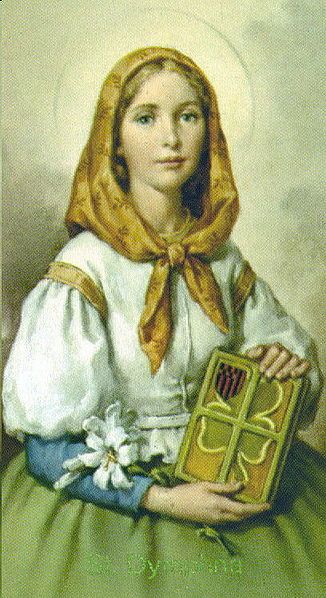Almighty and loving Father, by the example of St. Dymphna, Virgin and martyr, and by her intercession protect all those afflicted by tension and emotional stress, to enjoy your protection in life, and eternal happiness in your presence now and forever. Through Christ, our Lord, I ask. Amen.
Today, May 15, we celebrate the feast of Saint Dymphna (seventh century ), Virgin, Martyr, and patroness of those suffering from nervous disorders, mental afflictions, neurological problems, and mental health professionals. The story of Saint Dymphna’s life and martyrdom was preserved in her Acts, written in the thirteenth century. Her life is based upon oral tradition and a persuasive history of inexplicable and miraculous healings through her intercession.
Saint Dymphna was born the daughter of an Irish pagan chief and his Christian wife. Dymphna, like her mother, was blessed with grace, beauty, and virtue, and under the tutelage of local women, grew in her Christian faith. Baptized by a local priest, Father Garabran, Dymphna spent her days in pious reflection and prayer. Dymphna was a bright and eager pupil, and advanced rapidly in wisdom and grace. When still very young, being filled with fervor and love for Jesus Christ, Dymphna chose Him for her Divine Spouse and consecrated her virginity to Him and to His Blessed Mother by a vow of chastity.
Sadly, when Dymphna was just fourteen years old, her beautiful mother died, and her father was plunged into despair. His grief overtook him, and he dispatched messengers throughout the lands to find other women of noble birth who physically resembled his late wife so that he might re-marry. When none could be located, he was advised to marry his own daughter, Dymphna.
Dymphna’s father spoke to her of his plan, and she was horrified. She begged for forty days to consider his offer, and upon being granted her request, fled to Father Garabran who advised her to leave her homeland and live in exile to preserve her chastity. This she did, accompanied by her spiritual advisor and two friends. Together, they traveled into modern-day Belgium, settling in the tiny village of Gheel.
Dymphna’s father learned of her flight, and dispatched soldiers to locate her. Eventually, they set upon her and her companions in Gheel, and while Father Garabran defended her faith and chastity, it was ordered that his head be severed. Following his death, Dymphna’s father attempted to persuade her to return home. Unsuccessful and enraged with grief, he drew a dagger and severed her beautiful head, earning Dymphna the glory of the Martyr’s crown.
Tradition tells us that the relics of Dymphna and Garabran were buried in Gheel, and later discovered due to an inscribed brick placed in one of the coffins: "Here lies the holy virgin and martyr, Dymphna." The relics were translated to a silver reliquary, placed in the Gheel church named in her honor. Many miracles have taken place at this shrine, built on the spot where she was buried in Gheel, Belgium, and her relics are venerated still today.
Given her father’s reaction to the death of his wife, Saint Dymphna has been invoked since that time as the patroness against mental disease. A colony for those suffering from emotional afflictions was established at Gheel, and even today, as many as 1500 patients pilgrimage there for treatment and cure. At Gheel, the ill are treated with compassion and love, living among the people under observation, allowed to work in the fields, and given lodging by the community. The treatment results are very positive, though the intercession of Saint Dymphna.
Lord God, Who has graciously chosen Saint Dymphna to be the patroness of those afflicted with mental and nervous disorders, and has caused her to be an inspiration and a symbol of charity to the thousands who invoke her intercession, grant through the prayers of this pure, youthful martyr, relief and consolation to all who suffer from these disturbances, and especially to those for whom we now pray. (Here mention those for whom you wish to pray.)
We beg You to accept and grant the prayers of Saint Dymphna on our behalf. Grant to those we have particularly recommended patience in their sufferings and resignation to Your Divine Will. Fill them with hope and, if it is according to Your Divine Plan, bestow upon them the cure they so earnestly desire. Grant this through Christ Our Lord. Amen.
Why pray the Rosary every day for a year?
Each time the Blessed Virgin has appeared-- whether it be to Saint Bernadette Soubirous at Lourdes; to Lucia, Jacinta, and Francisco at Fatima; or to Mariette Beco at Banneux-- she has asserted the importance, saving grace, and power of praying the Holy Rosary on a daily basis. Based upon her words, the Rosary is penance and conversion for sinners, a pathway to peace, an end to war, and a powerful act of faith in Jesus Christ. Pope Paul VI presented the Rosary as a powerful means to reach Christ "not merely with Mary but indeed, insofar as this is possible to us, in the same way as Mary, who is certainly the one who thought about Him more than anyone else has ever done."
To show us how this is done, perhaps no one has been more eloquent than the great Cardinal Newman, who wrote: "The great power of the Rosary consists in the fact that it translates the Creed into Prayer. Of course, the Creed is already in a certain sense a prayer and a great act of homage towards God, but the Rosary brings us to meditate again on the great truth of His life and death, and brings this truth close to our hearts. Even Christians, although they know God, usually fear rather than love Him. The strength of the Rosary lies in the particular manner in which it considers these mysteries, since all our thinking about Christ is intertwined with the thought of His Mother, in the relations between Mother and Son; the Holy Family is presented to us, the home in which God lived His infinite love."
As Mary said at Fatima, "Jesus wants to use you to make Me known and loved. He wishes to establish the devotion to My Immaculate Heart throughout the world. I promise salvation to whoever embraces it; these souls will be dear to God, like flowers put by Me to adorn his throne."

Today, July 2, we celebrate the feast day of Saint Monegundis (died 650), Hermitess, Holy woman, and foundress of the convent of Saint Pierre-le-Puellier. Saint Monegundis lived a righteous and pious life, and only through tragedy and depression was called to more fully serve the Lord.
Monegundis was born in Chartres (northern France, near Paris), and lived a honorable life in the eyes of both the world and the Lord. She married, and together with her husband, was blessed with two beautiful daughter. Sadly, both daughters passed away before they reached adulthood, and Monegundis was deeply grieved. For many years, she struggled with a deep depression, which impacted her relationships with her husband, her family, and all her friends.
Over time, Monegundis came to understand her depression as a trial, given by the Lord, and with prayer and contemplation, came to find the healing grace of God. Monegundis came to realize that her depression was somewhat selfish, and even insulting to the Lord, as through her sadness and moaning she was doubting the wisdom and love of the gracious Father who had taken her daughters to be with Him in Heaven.
With this knowledge came full repentance, and with her husband’s permission, she took up residence in a small cell near a Church in Chartres, where she lived in total prayer and penance. After a few years, she moved to Tours, where she again lived as a hermitess, this time close to the tomb of Saint Martin of Tours. Her reputation for gentleness, holiness, and piety began attracting followers, and before long she had become the spiritual mother and advisor to a large group of women.
Based upon her followers, Monegundis established a convent, and eventually wrote a monastic rule, establishing the convent dedicated to Saint Pierre-le-Puellier. Following the establishment of the convent, she peacefully died. Numerous miracles were reported at her tomb.
Today, we pray for the wisdom and strength to convert those tragedies that we experience into opportunities for service to the Lord and one another. We pray in a special way for those struggling with depression and mental illness, that in the dark places, they may find the space to embrace the healing light of Christ, and come to love both themselves and the Lord in a newfound and profound manner.
Monegundis was born in Chartres (northern France, near Paris), and lived a honorable life in the eyes of both the world and the Lord. She married, and together with her husband, was blessed with two beautiful daughter. Sadly, both daughters passed away before they reached adulthood, and Monegundis was deeply grieved. For many years, she struggled with a deep depression, which impacted her relationships with her husband, her family, and all her friends.
Over time, Monegundis came to understand her depression as a trial, given by the Lord, and with prayer and contemplation, came to find the healing grace of God. Monegundis came to realize that her depression was somewhat selfish, and even insulting to the Lord, as through her sadness and moaning she was doubting the wisdom and love of the gracious Father who had taken her daughters to be with Him in Heaven.
With this knowledge came full repentance, and with her husband’s permission, she took up residence in a small cell near a Church in Chartres, where she lived in total prayer and penance. After a few years, she moved to Tours, where she again lived as a hermitess, this time close to the tomb of Saint Martin of Tours. Her reputation for gentleness, holiness, and piety began attracting followers, and before long she had become the spiritual mother and advisor to a large group of women.
Based upon her followers, Monegundis established a convent, and eventually wrote a monastic rule, establishing the convent dedicated to Saint Pierre-le-Puellier. Following the establishment of the convent, she peacefully died. Numerous miracles were reported at her tomb.
Today, we pray for the wisdom and strength to convert those tragedies that we experience into opportunities for service to the Lord and one another. We pray in a special way for those struggling with depression and mental illness, that in the dark places, they may find the space to embrace the healing light of Christ, and come to love both themselves and the Lord in a newfound and profound manner.
Earlier today, I wrote about the life of Saint Benedict Joseph Labre, the patron saint of the homeless, single men (bachelors), and the mentally ill. The Guild of Saint Benedict Joseph Labre (www.guildbjlabre.com) has commissioned a beautiful icon of Our Merciful Mother of the Mentally Ill. The artist explains that this icon depicts “The Mercy of God, revealed in His son through the intercession of the Virgin Mary, for all of those who live with and suffer from an emotional or mental disability.
Saint Benedict Joseph Labre is depicted exchanging a crown of thorns—symbolic of the suffering of those with mental illness—for the golden bejeweled crown of the Christ child—the eternal reward for patient endurance of suffering.
Our Blessed Mother, whom Saint Benedict Joseph was extremely devoted to, brings the Lord into our presence, carrying the child Jesus, offering Him to humanity, and joining us in His and our suffering. Despite the heavy walls and the stormy sky, the Blessed Virgin stands among the people, bringing forth the precious love of God to those in need.
Loving Creator, we come before you because we know that you are a God of love and compassion. We come as people of all creeds and all nations seeking your presence, comfort and guidance. We come as consumers, family members, friends, co-workers and mental health professionals. We come this day because we believe that you, Divine One, love each one of us just as we are and you walk with us on our individual journeys through life. You see the ignorance and injustice that divides and separates persons struggling with mental illness and you weep with us.
Give us courage to face our challenges and open us today to the many ways you are already working in our midst. Help us to identify mental illness as the disease it is, that we might have courage and wisdom in the face of ignorance and stigma. Inspire us as we seek to overcome fear, acquire knowledge, and advocate for compassionate and enlightened treatment and services.
Lead us as we open our hearts and homes, our communities and job opportunities, our houses of worship and communities of faith. Enable us to find ways to be inclusive of persons living with mental illness in our everyday lives. Be with doctors, therapists, researchers, social workers, and all those in the helping professions as they seek to overcome ignorance and injustice with care and compassion.
Sometimes, Divine Spirit, we feel discouraged and hopeless in the face of so many challenges. Help us to see ourselves as you see us…persons of value and worth…persons of creativity and potential. May we come to understand the interconnectedness of mind, body and spirit in bringing about health and wholeness. And may we go forward into our communities with a renewed sense of vision, hope and possibility for the future. Amen.
(Adapted from NAMI Day of Prayer, 2005)
Subscribe to:
Posts (Atom)



















